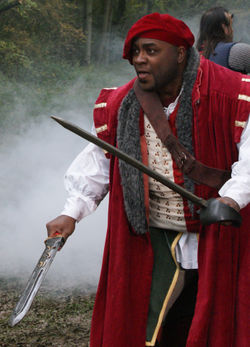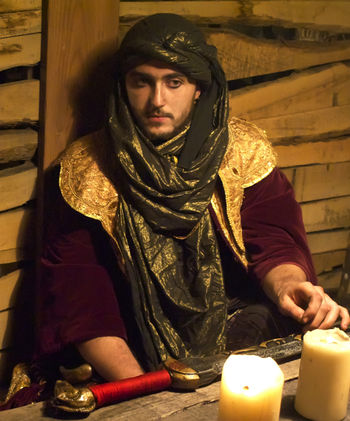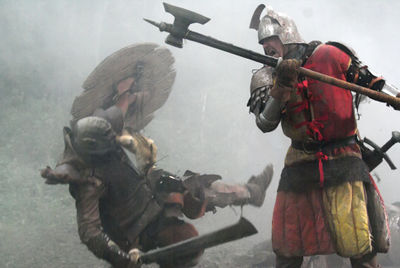Magic items
m (→Bonded Items: Fixed link) |
|||
| Line 5: | Line 5: | ||
*'''You can only be bonded to one item of each form at once''' | *'''You can only be bonded to one item of each form at once''' | ||
*'''Most magic items last up to four events''' | *'''Most magic items last up to four events''' | ||
Almost all magic items require you to be bonded to them to use them. Magicians can cast [[create bond]] to bond a character to an item, or an artisan can bond a character to any item that they know how to make. A bond lasts as long as the magic of an item endures, or until a magician breaks the bond using the | Almost all magic items require you to be bonded to them to use them. Magicians can cast [[create bond]] to bond a character to an item, or an artisan can bond a character to any item that they know how to make. A bond lasts as long as the magic of an item endures, or until a magician breaks the bond using the [[create bond]] spell. | ||
Personal magic items fall into one of three forms: weapons, armour, and talismans. You can only ever be bonded to one weapon, one suit of armour, and one talisman at any one time. | Personal magic items fall into one of three forms: weapons, armour, and talismans. You can only ever be bonded to one weapon, one suit of armour, and one talisman at any one time. | ||
Revision as of 15:47, 21 December 2023
Bonded Items
- Most magic items are made by artisans
- You must be bonded to these items to use them
- You can only be bonded to one item of each form at once
- Most magic items last up to four events
Almost all magic items require you to be bonded to them to use them. Magicians can cast create bond to bond a character to an item, or an artisan can bond a character to any item that they know how to make. A bond lasts as long as the magic of an item endures, or until a magician breaks the bond using the create bond spell.
Personal magic items fall into one of three forms: weapons, armour, and talismans. You can only ever be bonded to one weapon, one suit of armour, and one talisman at any one time.
E.g. Your character is bonded to a Shieldbreaker weapon. You cannot become bonded to a Giant's Maul two-handed axe because both of these items are weapons.
A character who has purchased the artisan skill can make at least one magic item before every event. Magic items last for a single year from the day of creation. This means that they can be used at the following four events before the magic is lost.
Non-bonded Items
- Some magic items are activated and do not need to be bonded
A very small number of rare magic items can be used without the user needing to be bonded to them. Usually these items are one-shot items that require activation by the wielder to invoke the magic stored in them. It is not possible to bond to these items.
You should always assume that an item requires bonding unless the explicitly told otherwise. The detect magic spell will tell the caster if an item does not require bonding to use.
Artefacts
- Artefacts are permanent magic items made by artisans using ilium
Artisans can use ilium to make a permanent artefact version of any magic item they can create. These powerful items retain their properties indefinitely, are readily identifiable as unique named items, and can exert powerful roleplaying effects over anyone bonded to them.
Personal Magic Items
- There are three types of magic item a character can be bonded to
- You can only be bonded to one of each form at once
- Many personal magic items require you to have one or more skills to bond to it
Characters may bond to three different types of personal items. You may only be bonded to one item of each form: weapons, armour, and talismans.
Each magic item has its own page on the wiki, but there is a summary of the magic items by category, linked on the right. The summary includes the name and basic effect of the item. There is also a complete summary of all magic items available.
Weapons
- Weapons include all items designed to be wielded
- You must have a weapon in hand and be actively using it to use its magical abilities
Most weapons are magic items designed to be held in the hand and wielded, presented or used. Weapons and implements are the most common weapons, but this type also covers icons, ritual staves and musical instruments.
Paired weapons and arcane weapons are a single magic item that consists of two one-handed weapons or a one-handed weapon and an implement respectively. They are intended to be used together, and count as a single object for purposes of bonding.
A ritual staff is designed to be used by a ritualist during the performance of a ritual. It must be a phys-rep of a staff that is over 42” long and up to 84” long. It does not need to be a weapon safe implement and you do not need the battle mage skill to bond to or use one of these items. You do need the battle mage skill to bond to and use a regular magical staff.
Icons and musical instruments are magic items designed to be held in the hands that are used by a character with the dedication skill. The phys-rep for a musical instrument must be a musical instrument more complex than a triangle, and it must be played by the character bonded to it as part of the appropriate roleplaying used to activate its powers. An icon must be a phys-rep of a piece of religious imagery appropriate to the Way - ideally including an image of a paragon or exemplar. In both cases, there is no minimum size for the phys-rep but they must be wielded to be used. That is, they must be held in one hand that is not being used to hold anything else for as long as it takes to use them. A magical icon or musical instrument may not be used as a weapon or implement, even if they are weapon safe.
Armour
| Armour | Skills Needed to Bond |
|---|---|
| Light Armour | |
| Medium Armour | |
| Heavy Armour | |
| Mage Robes | Magician |
| Mage Armour | Magician, Battle Mage |
| Vestments | Dedication |
- Armour includes all magic items that cover the body
- You must be wearing magic armour to use its magical abilities
Armour includes all magic items that cover a significant portion of the body when worn. The phys-rep for magical armour must cover the majority of the torso and at least one other location. Valid locations are the head (with a helm), the arms and the legs, or you may cover half of your arms and legs. Likewise, magical mage armour must comply with the coverage rules for normal mage armour.
Robes and vestments must be phys-repped with an article of clothing worn on the body such as a belt, sash, coat, jacket, or robe.
It is acceptable to wear a suit of heavier armour over the top of a suit of lighter magical armour, provided you phys-rep both sets of armour. You gain the hits and protection of the heaviest armour you wear, and the benefits of any magical armour you wear.
Talismans
| Talismans | Skills Needed to Bond |
|---|---|
| Shields | Shield |
| Jewellery | |
| Foci | Magician |
| Tools | Physick or Apothecary or Artisan |
| Regalia | Dedication |
| Standards |
- You must be wearing or actively using a talisman to use its magical abilities
Talismans cover several different groups of magical items, including shields, ritual foci, ceremonial regalia, jewellery, and tools. Jewellery, regalia, and foci must be worn to use their magical abilities; shields and tools must be held in the hand to use their abilities.
Jewellery must be a phys-rep of an item that is worn. It may take the form of actual jewellery such as an amulet, ring, bracelet, or circlet. It may also take the form of any other small item intended to be worn, such as an embroidered favour, decorative braid, and the like. As much as possible the item should look distinctive and decorative.
Foci are items such as rings and masks that help focus energies in rituals. They can only be used by magicians.
Some tools are used by physicks, some by apothecaries, and some by artisans. You must have the appropriate skill to use a tool to be able to bond to it.
Magic Standards
A magic standard is a specific type of talisman. The phys-rep must be a banner or standard that is carried in the hand: it cannot be a back-banner or tabard. The banner pole must be at least 60" long, and the standard must be six square feet or more in area and at least one foot in any dimension (for example a 24" by 36" banner, or a 12" wide, 72" long pennant). You can include decorative additions to banners that are close to the minimum size to make them meet the requirements.
A standard must be wielded in at least one hand or it has no effect. You may not use a magic standard in the same hand as a shield or weapon. Regardless of construction, a standard cannot be used as a weapon nor may it be used to parry.
Group Magic Items
| Group Magic Items | Band |
|---|---|
| Gonfalons | Banner |
| Paraphernalia | Coven |
| Reliquaries | Sect |
- A band may only be bonded to one magic item at a time
- The magical item must be present and in use for the members to gain the benefit
These magic items must be bonded to a band to gain their benefits. A band can only be bonded to one magic item at a time and it must be present and actively in use for them to gain any benefits from it.
Gonfalon
A gonfalon provides an advantage to a banner. They follow the same phys-rep rules as magic standards. However a gonfalon is bonded to the entire band - rather than to a single individual like a magic standard.
Paraphernalia
Paraphernalia are props used in rituals by covens, that provide powerful bonuses to the magical strength of everyone in the coven. They can be orbs, books, chalices, or similar.
Reliquaries
A reliquary can be any phys-rep of a suitable relic, statue, chalice, tome, or actual reliquary.
Changing Magic Items
- You can never use two items of the same type in the same day
- If an item has been used then it cannot be used again that day
Any magician can perform a spell that breaks the bond between an item and a character. If the character has used the ability of their magical item in any way that day then they cannot benefit from the abilities of another item of the same type in the same day. The item is also affected - any character that is bonded to an item that has been used that day cannot make use of it until the following morning. The ref will inform you if an item has already been used that day when you are bonded to it.
E.g. You have a Shieldbreaker magic weapon that you have used to call SHATTER earlier that day, using the item. You cannot use any other magic weapon until the following day even if you bond to a new weapon. No other character can use this magic weapon until the following day even if they become bonded to it.
If the character or item is not present when the break bond spell is cast then the power of the item for the day is automatically used, as is the character’s ability to use an item of that type for that day.
Schema
- A schema describes the method of creating a single magic item
- A schema requires ilium to create
- An artisan can use a schema they possess to learn how to make the item it describes
- It is not possible to copy a schema
- A schema can be destroyed with the Words of Ending ritual as if it were an artefact
A schema (plural:schemata) is a rare, magical item that contains all the details necessary to create a magic item. Schemata are made at a runeforge. Most (though not all) schemata include a description of the item, including all the rules, and at least some in-character commentary on the item.
A character who has the physical schema can learn how to make the item it describes by buying the extra item skill or using an empty item slot. This follows all the other rules for learning a skill during time-in. The schema must be taken to GOD or shown to a referee to allow the item it describes to be mastered in the field.
Every schema is a permanent item, but it requires the rare material ilium to create. A schema needs 10 rings of ilium to create.
The Imperial Senate can raise a motion to add a schema to the list of items any citizen can learn to make. If the motion passes, it costs 10 thrones to distribute the knowledge contained in the schema. The schema must be handed over to the civil service, and is destroyed in the process. If the Senate chooses to make the knowledge in a schema public knowledge, any character can learn to make the item and its details will be added to the wiki. The Senate could devolve this power to another body (such as the Imperial Conclave).


